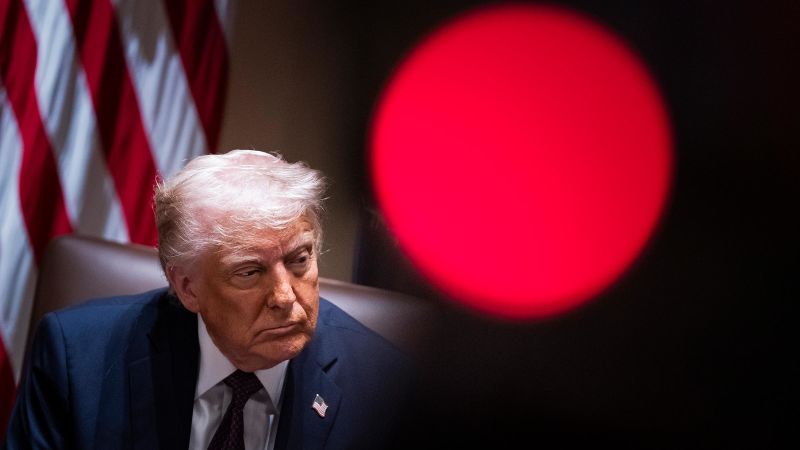A version of this story appeared in CNN’s What Matters newsletter. To get it in your inbox, sign up for free here.
CNN
—
Listening to President Donald Trump is often an exercise in gauging whether he’s serious or not.
Is he serious about tariffs that could drive the US economy into recession? We’ll find out more this week.
Is he serious about protecting Social Security and Medicare? It could depend on your definition of “waste, fraud and abuse.”
There is little question, however, that Trump is “not joking,” as he told NBC News in a phone interview Sunday, when he talks about running for a third term.
That’s despite how fantastical it seems that a president could ignore the 22nd Amendment and all the hurdles to changing the Constitution’s two-term limit.
“There are methods,” Trump said, to run for a third term, but he did not elaborate.
He has talked about a third term repeatedly, but never before has he sounded this serious.
“We have almost four years to go and that’s a long time, but despite that, so many people are saying ‘You’ve got to run again,’” he told reporters on Air Force One on Sunday. “They love the job we’re doing.”
While running for a third term is clearly unconstitutional, if there’s anything Trump has shown us, it’s that he can normalize things that don’t seem possible.
After the January 6 Capitol riot, Trump was treated as a pariah by Republican lawmakers. Now he is at the height of his power.
“Don’t underestimate Donald Trump’s willingness not only to socialize the unthinkable in American politics, but actually to act on it,” said Susan Glasser, the New Yorker writer and author of a new book documenting Russian President Vladimir Putin’s rise, appearing on CNN’s “Inside Politics.”
When Putin was barred by Russian law from serving a third consecutive term, he became the country’s prime minister, but is widely thought to have maintained control of the government under then-President Dmitry Medvedev.
Trump has watched other world leaders escape term limits, including China’s Xi Jinping, whom Trump has admiringly referred to as China’s “president for life.” Turkey’s President Recep Tayyip Erdogan is moving closer to evading term limits and his main rival has been arrested.

“What’s really remarkable here is the willingness to flout the law, to test the basic norms of settled governance,” Glasser said of Trump’s apparent desire to stay in office.
Rep. Dan Goldman, a New York Democrat, tried and failed to get his fellow lawmakers to take a vote last year before Trump took office clarifying that Trump could only serve the two terms.
Goldman said in a statement that he now sees Trump’s multiple “constitutionally suspect actions,” leading up to an effort to stay in office.
“Republicans are waging an all-out attack on the Judiciary to clear the way for Trump to serve a third term,” he said.
Testing the US Constitution, over and over again
Much of Trump’s second-term policy is built on a strategy of testing presidential power, even when it violates plain language in the Constitution, such as that giving Congress power over spending or guaranteeing birthright citizenship. An effort to run again would fit easily alongside those other constitutional tests.
CNN presidential historian Tim Naftali pointed out on CNN that Trump is using fear as a policy tool in order to exact concessions from other countries and to pressure universities, law firms and lawmakers.
This makes some sense. Once the conversation turns to what comes after Trump, he will lose leverage and power. There’s a reason presidents nearing the end of their terms are referred to as lame ducks. There’s still a lot of Trump’s second term left to go, and he will want to maintain momentum for as long as possible.
But it’s also true that Trump tried to use unconstitutional theories to stay in office before, when he pressured then-Vice President Mike Pence to reject electoral votes.
Trump is not the only person talking about a third term. Stephen Bannon, an early Trump acolyte who worked as a chief strategist in Trump’s first term and then served months in prison for refusing to testify before the House January 6th Committee, has said there is active consideration about how to make a third Trump term happen.
“I’m a firm believer that President Trump will run and win again in 2028,” Bannon told NewsNation’s Chris Cuomo in March. “A man like this comes along once every century, if we’re lucky,” Bannon said.
Cuomo asked how, given the obstacles in the Constitution, a third Trump term could happen.
“We’re working on it,” Bannon said. “I think we’ll have a couple of alternatives. Let’s say that.”
He considers the US to be in the midst of a “1932-type realignment” — a reference to the outset of the New Deal and FDR’s creation of the administrative state that Bannon and Trump are trying to dismantle.
Bannon did not respond to a request for updates Monday on what these alternatives might be.
Meanwhile, there has already been quite a bit of conjecture about how a president might try to stay in office. Here are some of the ideas, all of which have major flaws:
We’ve written before that the 22nd Amendment is quite clear. Without restating that entire argument, simply look at the first line of the amendment, which reads, “No person shall be elected to the office of the President more than twice.”
Changing that amendment would be nearly impossible, requiring 38 states to agree.
“President Trump doesn’t have the constitutional cards,” Naftali said.
Bannon is among those looking to poke holes in the relatively simple language, arguing perhaps it should not apply to Trump since he did not serve consecutive terms, although there’s no such exemption in the amendment.
The basic idea here is that Vice President JD Vance or some other willing follower would run for president in Trump’s stead, with Trump as their running mate. Vance or whoever ran as president would then resign, enabling Trump to become president.
The major problem is that the 12th Amendment clearly states that “no person constitutionally ineligible to the office of President shall be eligible to that of Vice-President of the United States.”
Twice-elected Trump is constitutionally ineligible.
Since he can’t run for vice president, perhaps Trump could be made speaker of the House, assuming Republicans control the House in 2029, and then both the Republican president and vice president, assuming a Republican wins the 2028 election, could resign, allowing Trump to stay in the White House.
We’re deep into hypotheticals here, and these scenarios require lock-step agreement of Republicans in Congress.
GOP Rep. Ryan Zinke, who represents Montana in the House and was interior secretary during Trump’s first term, suggested to CNN’s Pamela Brown on Monday that he would oppose changing the Constitution to accommodate a third Trump term.
“I like it as written, and I think most Americans do too,” Zinke said.

